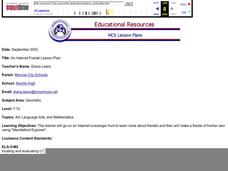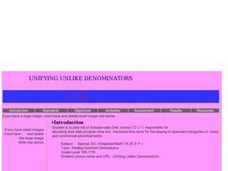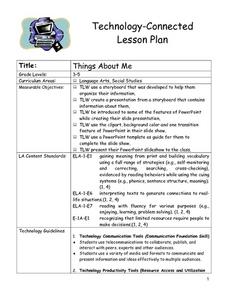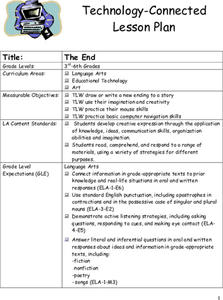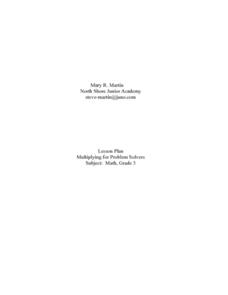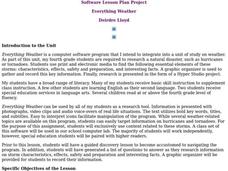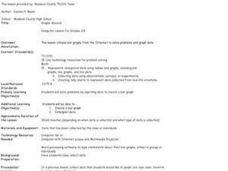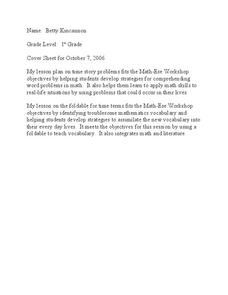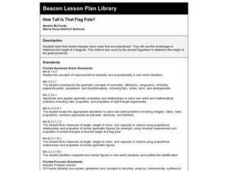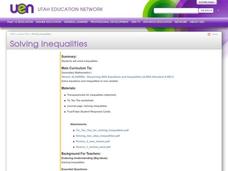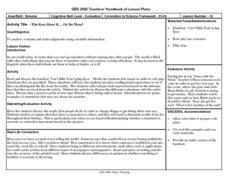Curated OER
Geometry: Fractal Scavenger Hunt
Students experience an Internet fractal scavenger hunt. They write a report on fractals using the Internet and recording the sites where they are located.
Curated OER
Unifying Unlike Denominators
Students play roll of fictional radio disk jockeys. They allocate their daily program time into fractional time slots for the playing of specified catagories of music and commercial advertisements.
Curated OER
Chuukese Dinner (high School)
High schoolers read journal entries about having dinner with a Chuukese family. Using this information, they identify which foods sound appealing and compare and contrast Micronesian and American foods, fruits and vegetables. In...
Curated OER
A Day at the Beach
Student read Sheryl Wilson's story, "A Day at the Beach" while classifying items they find. They design a chart of the items before using educational graphing software to create a graph.
Curated OER
Things About Me
Learners watch as the teacher explains how to use a storyboard to plan a PowerPoint presentation. They examine how to use clip art, background colors, and at least one transition before creating a PowerPoint presentation according to the...
Curated OER
The End
Learners listen as the teacher reads a story. Pictures are displayed as the teacher reads the story. Students jot down ideas for the story ending, and create an illustration to compliment their story. Student story endings and...
Curated OER
Charlie and the Chocolate Factory
Eighth graders read and discuss Charlie and the Chocolate Factory. Then they invent a candy bar, name it and draw a picture of it. Finally, they write a short descriptive paragraph about it.
Curated OER
Math: Creating Problems on Computers
Third graders, in pairs, create math story problems on computers. Skills include multiplication or addition and subtraction in two-step problems. After devising their problems, 3rd graders type them and use pictures to illustrate them....
Curated OER
At Home on the French Frontier: 1700-1800
Students role play bartering for goods and services as the French settlers did in colonial Illinois. They start with eight household items to acquire through bartering. They have to calculate values for each object and determine the...
Curated OER
Angle Measurement of Aircraft Wings and Tails
Students measure the angles of wings and tails of various aircraft using a protractor. They estimate and check their measurements. They investigate aircraft being developed and tested at NASA Dryden.
Curated OER
Everything Weather
Fourth graders use print and electronic media to find the following essential elements of these storms: characteristics, effects, safety and preparation, and interesting facts. A graphic organizer is used to gather and record this key...
Curated OER
Graphs Abound
Students create a survey for their classmates to collect data on their favorite foods, eye color, pets or other categorical data. They compile the data from the survey in a table and then make a bar graph of each category using a web tool.
Curated OER
Sliding Along
Third graders use a ruler that has a bag tie slider attached to it to measure a number of items. While measuring, they complete a "Sliding Along" worksheet and a "Sliding Synthesis Journal." In the journal entry, they include what they...
Curated OER
Time Story Problems
First graders solve story problems using an analog clock. In this time story problems lesson plan, 1st graders complete word problems on elapsed time and discuss their solutions.
Curated OER
M&M Exponential Activity
Students create a scatter plot of their experimental data. In this algebra lesson, students use M&M's to determine an algebraic model. They discuss results in class.
Curated OER
The Snack Bar
Sixth graders complete a purchase order. In this ratios and patterns lesson, 6th graders work in groups to complete a purchase order for a grand opening of the school snack bar. Students use rations to figure out the need and quantity...
Curated OER
How Tall Is That Flag Pole?
Middle schoolers examine various triangles and discuss how similar triangles have sides that are proportional. They utilize an ancient Egyptian method to determine the height of a flagpole.
Curated OER
Solving Inequalities
Seventh graders explore the concept of solving inequalities. In this inequality lesson, 7th graders construct inequalities for scenarios such as getting a driver's license and height requirements at a theme park. Students practice...
Curated OER
A Scheduling Dilemma
Young scholars solve train-scheduling word problems using a four-step problem solving model. In this problem solving lesson, students work in groups to a four-step procedure about a train scheduling dilemma.
Curated OER
Variables and Patterns: Determining an appropriate scale while graphing
Sixth graders determine appropriate scales when graphing data. In this graphing activity, 6th graders use an the applet "Graph It" to determine what is an appropriate scale for their data.
Curated OER
The Eyes Have It ... Or Do They?
Learners explore facial expressions for the hidden meanings being communicated. Truth can be hidden or at least disguised by a particular expression. The reality of control and the manipulation of truth is discussed in this lesson plan.
Curated OER
Linear Patterns in Data
Eighth graders extend their learning of graphing linear equations and are introduced to connecting patterns in tables and graphs to represent algebraic representations. They then determine patterns and extrapolate information from these...
Curated OER
The Importance of Plants to Native Cultures in the Past and Present
Eighth graders investigate the founding and history of Sluice Boxes State Park. They use both primary and secondary resources to collect data. The focus is upon the use of native plants to make medicines. They write reports about several...
Alabama Learning Exchange
The Path to Positive
Students demonstrate how to add positive integers. In this computation instructional activity, students read the book Less Than Zero and use a number line and counters to play an addition game using positive integers.


